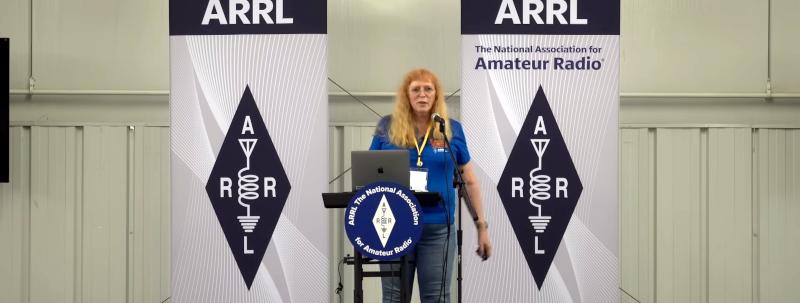Everyone who deals with electronics knows that grounding is important. Your house has a copper rod in the ground. But [Kristen K6WX] has news: the idea of ground is kind of a myth. She explained at a talk at the recent ARRL National Convention, and if you didn’t make it, you can watch it in the video below.
The problem is analogous to finding something that is standing still. You really can only talk about something standing still relative to something else. Sure, you might be standing still outside a building, but seen from the moon, you and the building are spinning around at about one revolution per day. If you were sitting on the sun and not burning up, you’d see lots of motion of everything, and, of course, the sun itself is moving in the right frame of reference.
So what’s ground? Just a common reference between two things. [Kristen] gets into RF grounds, DC grounds, and phasors. If you’ve ever wanted to ground your antenna or deal with RF interference, you’ll find a lot of information in this 45-minute video.
The name ground is, perhaps, unfortunate. You do want earth grounding for lightning protection, but what most of us think of as ground is just a convention. Need a -9V battery? Just reverse your meter leads, and there you go.
Getting a good common reference can be maddening. We’ve looked at way too many ground loops before.
















My boss at the 2-way radio shop used to say you’re better off not grounding anything. Since that’s not going to work, ground everything (within the limits of ground loop avoidance).
Or, ground everything, then start removing ground connections one by one until hums and all ground loop induced noises disappear:)
Tingling stops.
I wonder if it will be friends with me?
seems that no one got the reference, ah the young these days….
Double Thumbs up for the reference
“Oh no, not again”, thought the petunias – finding out why is called Science.
One thing she never mentions is magnetic antennas. They have their own problems, like being adversely affected by any resistance at all in the loop, but they really don’t care about ground and don’t need a counterpoise, since they produce an H field rather than an E field.
Partly correct.
Loop antennas don’t need to be grounded simply because they are balanced and don’t require a counterpoise, like any other dipole (which they are).
Small loop antennas are predominantly H field within a couple of loop diameters, but any actual propagating wave (i.e., those that actually reach other antennas) contains exactly the same mix of E and H as any other antenna.
And they most certainly interact with the (dirt) ground, like any other antenna.
They are affected by resistance just like any other resonant antenna too: Resistance lowers their Q, increases their bandwidth, just like any other antenna. Because a (small) loop *requires* a high Q to get any semblance of efficiency, it is more sensitive to its internal resistance than more efficient antennas, like larger loops or full-size dipoles.
I think in theory ground potential is absolute. If you have the same amount of protons and electrons, their charges sum up to zero.
But we don’t work with theory. We with with solder, copper and grief.
H Hack, June 5th 12:41am: you forgot to add: blood, toil tears and sweat.
Percentage wise it’s like 60% grief 40% everything else
Yes, and it would be interesting to get actual information about our absolute potential. I am sure there is such data somewhere but I haven’t found it yet. I have read some interesting theories about “electric universe” that planets have electric properties that have effect on how they move or work.
If you think about our atmosphere it can be thought as a capacitor with ground and ionosphere being conductors and the airgap is the insulator. Clouds make the insulator conduct ant that is why lightnings happen. I mean it is only a theory and it would be nice to know about the potential between ground, ionosphere and clouds to falsify or support such a theory.
Absolute potential is easily to calculate, and is standard first semester E&M for highschool and undergraduates. But it isn’t very useful. The ‘electric universe’ stuff is from the same shovel as zero point energy extraction and the like.
The change in potential near the surface of the earth is of the order 100V/m of altitude, with the earth being negative (excess electrons).
When you are parachuting with a walkie-talkie, suddenly ground is very important.
Much of the problem with “ground” is the word. It’s way too ambiguous.
It can be many different, sometimes mutually-incompatible, things:
– Protective Earth: the common reference potential that we live in and hope our appliance chassis’ are bonded to.
– Neutral, or power supply return. Usually expected to be close to Protective Earth potential.
– RF signal return path, like the shield conductor on a coax cable or stripline, or the ground plane on a PCB microstrip. Not at all like the neutral or power supply return, but often confused as such since they are usually at the same DC potential.
– RF counterpoise in (e.g.) an antenna
– Actual ground dirt or water, behaving as a reflector for RF antennas
Using terms to disambiguate the function of the ‘ground’ helps a lot in understanding what we are talking about.
Bingo! :-)
Exactly so.
Anyone who passed their Tech license last week are now
antenna experts. :)
Shocking that an oversimplification that we use to explain things to children isn’t the ground truth…
…that was sarcasm.
OF COURSE it is relative.
EVERYTHING is relative.
– motion
– time
– distance
Anything that isn’t is either purely an idea or is arbitrary.